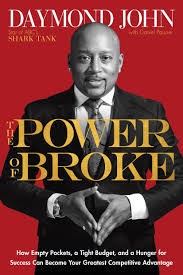I interview celebrities for a living. They often reveal what makes them successful. Here’s what I learned from Daymond John.
- Learn to multitask.
Daymond is one of the busiest guys I know — between filming Shark Tank, running his apparel company Fubu, being a motivational speaker and overseeing his gaggle of investments, he’s constantly on the move.
“I’ve been traveling about 280 days a year,” he recently told me when we sat down for a story I wrote for The New York Times.
How does he swing it? By being smart with his time. When he’s on a plane, for example, you won’t catch him catching up on new episodes of, say, Game of Thrones or Better Call Saul.
“I have 10,000 emails to answer,” he said. “I can’t afford to get hooked on those things.” Instead of wasting in-air hours, he uses them to crush his to-do list.
2. Learn how to decompress.
“I’m never alone,” Daymond said when describing his jam-packed days and nights.
But here’s the thing — Daymond is an introvert. He needs time to himself to decompress and chill with his own thoughts.
When I asked how he feeds his need for alone time, he said he works out.
Typically, he’ll go to the gym until 11 p.m. and then walk around the streets of New York. “I’ll walk the city until 1 a.m., with my headphones on. I’ll walk up the West Side Highway, through Central Park, whatever.” If he’s lucky enough to be at his country house in upstate New York, he’ll go fishing, biking, run up and down his super-long driveway or throw knives at a tree — then call it a day.
3. Learn new stuff.
Daymond’s got a hefty social media presence, what with his frequent inspirational tweets and photos and all. When I asked how he morphed into such a social media ace, he said, “I’m never an ace. I’m learning it — I continue to learn it.”
Actually, being self-taught is one of Daymond’s trademarks — and keys to success. Case in point: Before hitting the big time with Fubu, he worked at local restaurants and absorbed everything he could get his hands on that related to running a successful business.
“I started off at Church’s Fried Chicken, then I worked in a place that used to do egg creams, knishes and popcorn,” he told me. “I used to look at the manuals of all the places I worked at. I wasn’t reading to study it, necessarily, but I remember reading it and going, ‘Wow, this is interesting.’”
Later, at Red Lobster, he started to actively study what he saw and listened closely to what the managers said. “They’d basically tell you to push everything from apps to drinks to desserts — because they weren’t making any money from the entrees,” he said. “I’d say, ‘Where are you getting that statistic from?’ and they’d show me the book. There was these big spreadsheets and there were these percentages and I’d go, ‘Wow.’”
What we know now, of course, is he turned what he learned into gold. Buckets and buckets of gold.
Originally published at medium.com


